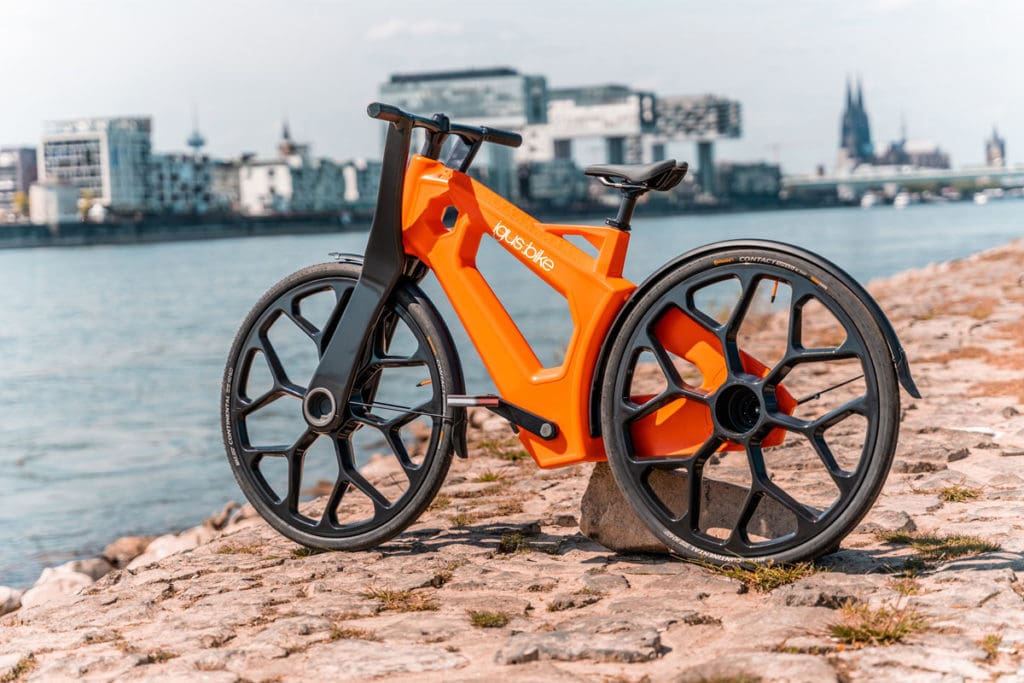Igus Unveils First Bike Constructed Entirely From Recycled Plastic

Cologne, Germany
The world’s first urban bike made entirely from recycled plastic has been unveiled by German company igus.
The igus:bike, scheduled for release later this year, is being promoted as “tomorrow’s mobility from yesterday’s waste”.
With recycled plastic used to construct everything from the frame to the bearings and toothed belt, igus says the bike does not require any maintenance, won’t corrode and brings new standards in sustainable mobility.
igus, which specialises in “plastic for motion”, is making the engineering concept and key components available to all bicycle manufacturers through its new igus:bike platform.
“The world is drowning in plastic waste. The huge piles in landfill sites are growing fast,” the company says.
“Some of this plastic ends up in the ocean, enters the food chain, and becomes a danger to marine, animal and human life. Therefore, it is most urgent to move away from the traditional linear economic model and migrate to a fully circular economy.”
igus has been developing ideas for recycling plastics for many years.
Its CEO, Frank Blasé says: “The plastic in rubbish dumps around the world is becoming a valuable resource.”
“The platform is intended to become a contact point for manufacturers who want to build a plastic bicycle and for all manufacturers of suitable components, such as plastic frames, wheels, drives, and pinions.”
He first had the idea for igus:bike during a beach holiday, talking to bicycle rental staff about the major problems they had with beach bikes.
“These were continuously exposed to sand, wind and saltwater and sometimes only lasted three months before they had to be replaced,” he said.
“The igus:bike does not rust. Owners can leave the single-speed bike outdoors in all weather and clean it in seconds with a garden hose.
“Bicycle gears made of plastic were unthinkable for a long time.”
igus:bike’s wheel bearings and plain bearings in the seat post, brake levers and pedals have integrated solid lubricants and ensure low-friction dry operation – without any lubricating oil.
“These tribo-plastics from igus have been used successfully for a long time and are currently used in more than 70 industries: in automobiles, tractors and robots,” the company says.
“They have also had many fans in the bicycle industry for decades. They have been proving their worth there for a long time in such applications as mountain bikes and e-cargo bikes.”
Shared Knowledge
The igus:bike platform offers bicycle manufacturers all over the world “the opportunity to jointly advance this technology”.
“The platform continuously shows the status and progress of all components and explicitly invites market players to participate. We want to enable the bicycle industry to produce plastic bikes,” Frank said.
“In the future, the all-plastic bicycle is to be available both in a variant made of new plastic and in one made entirely of recycled material.”
“The platform is intended to become a contact point for manufacturers who want to build a plastic bicycle and for all manufacturers of suitable components, such as plastic frames, wheels, drives, and pinions.”
“The platform is already hosting initial corporate collaborations.”
igus is partnering with Dutch start-up MTRL, which is helping to refine plastic bicycles and aims to start manufacturing and selling a children’s model and an adult bike before the end of this year.
An e-bike is also planned.
“In the future, the all-plastic bicycle is to be available both in a variant made of new plastic and in one made entirely of recycled material,” igus says.
“The first prototypes, successfully produced and tested, were made of material from old fishing nets.
“The adult bike made of virgin plastic is to cost €1,200 (A$1,781). There will be a surcharge of €200 (A$296.82) for the recycled-plastic variant.”
MTRL is planning manufacturing facilities near plastic landfills around the world.
“We have lots more ideas, such as installing condition monitoring using igus smart plastics,” Frank added.
“That would let you use your smartphone to see how many more thousands of kilometres the bike can take. That will hopefully convince many people who are still sceptical about plastic.”
Join the Conversation
Is this a promising future direction for bicycles?
